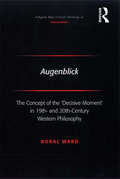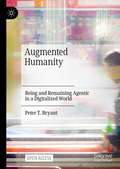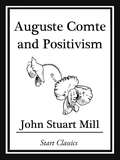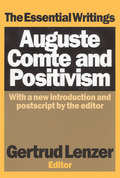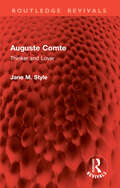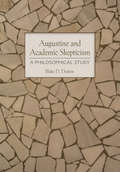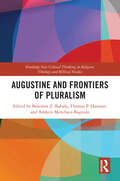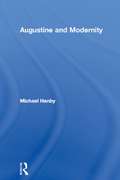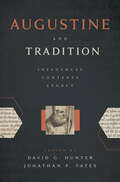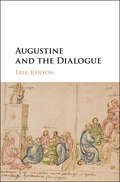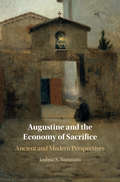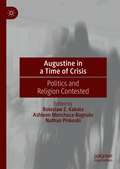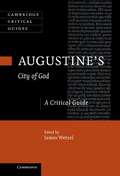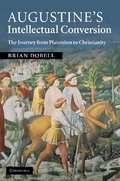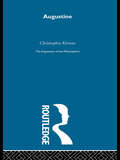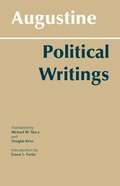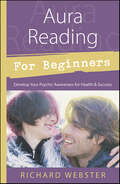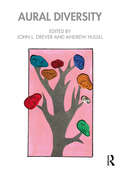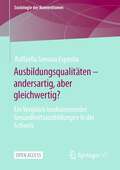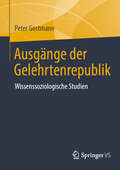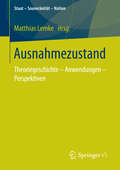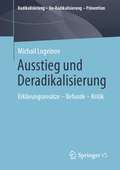- Table View
- List View
Augenblick: The Concept of the 'Decisive Moment' in 19th- and 20th-Century Western Philosophy (Ashgate New Critical Thinking In Philosophy Ser.)
by Koral WardAugenblick, meaning literally 'In the blink of an eye', describes a 'decisive moment' in time that is both fleeting yet momentously eventful, even epoch-makingly significant. In this book Koral Ward investigates the development of the concept into one of the core ideas in Western existential philosophy alongside such concepts as anxiety and individual freedom. Ward examines the whole extent of the idea of the 'decisive moment', in which an individual's entire life-project is open to a radical reorientation. From its inception in Kierkegaard's works to the writings of Jaspers and Heidegger, she draws on a vast array of sources beyond just the standard figures of 19th and 20th century Continental philosophy, finding ideas and examples in photography, cinema, music, art, and the modern novel.
Augmented Humanity: Being and Remaining Agentic in a Digitalized World
by Peter T. BryantThis open access book will examine the implications of digitalization for the understanding of humanity, conceived as a community of intelligent agency. It addresses important topics across a range of social and behavioral theories and identifies a range of novel mechanisms and their social behavioral effects. Across the book, the author highlights the expansion of intelligent processing capability brought about by digitalization and the challenges this exposes for integrating artificial and human capabilities. It includes the altered effects of bounded rationality in problem solving and decision making; related changes in the perception of rationality, plus novel myopias and biases. It also seeks to address cognitive intersubjectivity, learning from performance and agentic self-generation; and the novel methods and patterns of reasoned thought which emerge in a digitalized world; and how these mechanisms will combine in making and remaking the world of human experience and understanding. This book examines the problematics and prospects for digitally augmented humanity. In doing so, it maps the terrain for a future science of augmented agency. It will have cross-disciplinary appeal to students and scholars of applied psychology, cognitive and behavioral science, organizational psychology and management, business, finance, and digital cultures and humanities.
Auguste Comte and Positivism
by John Stuart MillOne of the foremost figures of Western intellectual thought in the late 19th century, John Stuart Mill offered up examinations of human rights, personal and societal rights and responsibilities, and the striving for individual happiness that continue to impact our philosophies, both private and political, to this day. This concise but explosive essay is perhaps the best example of how far-reaching-and necessary on an ongoing basis-his thinking was. In this 1865 work, Mill discusses the rational "religion" of French philosopher and social scientist Auguste Comte, reviewing his fellow thinker's great treatise on human behavior as knowable, quantifiable, and correctable from both positive and negative angles, "endeavouring to sever," the author writes, "what in our estimation is true, from the much less which is erroneous." English philosopher and politician JOHN STUART MILL (1806-1873) served as an administrator in the East Indian Company from 1823 to 1858, and as a member of parliament from 1865 to 1868. Among his essays on a wide range of political and social thought are Principles of Political Economy (1848), Considerations on Representative Government (1861), and The Subjection of Women (1869).
Auguste Comte and Positivism: The Essential Writings
by Gertnid LenzerAlthough Auguste Comte is conventionally acknowledged as one of the founders of sociology and as a key representative of positivism, few new editions of his writings have been published in the English language in this century. He has become virtually dissociated from the history of modern positivism and the most recent debates about it. Gertrud Lenzer maintains that the work of Comte is, for better or for worse, essential to an understanding of the modern period of positivism. This collection provides new access to the work of Comte and gives practitioners of various disciplines the possibility of reassessing concepts that were first introduced in Comte's writings.Today much of the ordinary business of academic disciplines is conducted under the assumption that the realm of science is essentially separate from the realms of politics and science. A close reading of Comte will reveal how deeply such current ideas and theories were originally embedded in a particular political context. One of his central methodological principles was that the theory of society had to be removed from the arena of political practice precisely in order to control that practice by means of these same sciences. It is in Comte's work that the reader will be able to observe how the forces of social and political reaction began to be powerfully organized to combat the critical forces in its own and later eras. Auguste Comte and Positivism will be of importance to the work of philosophers, sociologists, political theorists, and historians.
Auguste Comte: Thinker and Lover (Routledge Revivals)
by Jane M. StyleFirst published in 1928, Auguste Comte is a biography of the famous French philosopher Auguste Comte, the founder of the doctrine of positivism. In this book, the author traces Comte’s journey from his birth till his death. The final chapter ‘After Days’ provides a commentary on the changes the society underwent over a course of seventy years after Comte’s death. The author draws upon the works of Auguste Comte published during the period 1829–1927 to give an extensive and well researched account of the philosopher’s life and work.
Augustine Deformed
by John M. RistAugustine established a moral framework that dominated Western culture for more than a thousand years. His partly flawed presentation of some of its key concepts (love, will and freedom), however, prompted subsequent thinkers to attempt to repair this framework, and their efforts often aggravated the very problems they intended to solve. Over time, dissatisfaction with an imperfect Augustinian theology gave way to increasingly secular and eventually impersonal moral systems. This volume traces the distortion of Augustine's thought from the twelfth century to the present and examines its consequent reconstructions. John M. Rist argues that modern philosophies should be recognized as offering no compelling answers to questions about the human condition and as leading inevitably to conventionalism or nihilism. In order to avoid this end, he proposes a return to an updated Augustinian Christianity. Essential reading for anyone interested in Augustine and his influence, Augustine Deformed revitalizes his original conception of love, will and freedom.
Augustine and Academic Skepticism: A Philosophical Study
by Blake D. DuttonAmong the most important, but frequently neglected, figures in the history of debates over skepticism is Augustine of Hippo (354–430 CE). His early dialogue, Against the Academics, together with substantial material from his other writings, constitutes a sustained attempt to respond to the tradition of skepticism with which he was familiar. This was the tradition of Academic skepticism, which had its home in Plato's Academy and was transmitted to the Roman world through the writings of Cicero (106–43 BCE). Augustine and Academic Skepticism is the first comprehensive treatment of Augustine’s critique of Academic skepticism. In clear and accessible prose, Blake D. Dutton presents that critique as a serious work of philosophy and engages with it precisely as such. While Dutton provides an extensive review of Academic skepticism and Augustine’s encounter with it, his primary concern is to articulate and evaluate Augustine’s strategy to discredit Academic skepticism as a philosophical practice and vindicate the possibility of knowledge against the Academic denial of that possibility. In doing so, he sheds considerable light on Augustine’s views on philosophical inquiry and the acquisition of knowledge.
Augustine and Frontiers of Pluralism (Routledge New Critical Thinking in Religion, Theology and Biblical Studies)
by Boleslaw Z. Kabala, Thomas P. Harmon, and Ashleen Menchaca-BagnuloThis book focuses on St. Augustine as a worthwhile resource for thinking through the challenges and prospects of pluralism. The contributors speak to several dimensions of this organizing concept, understanding of which is advanced by engagement with Augustine. The volume brings together scholars from different disciplines, faith traditions, and political commitments, all of whom have deemed it worthwhile to return to Augustine to learn about a signature theme of common life in the twenty-first century. The chapters address a variety of topics including civic engagement, feminism, Black religious thought, domination, liberalism, and time. In an age of pluralism, the hope is to access the insights of the thinker who struggled with a plurality of desires, motivations, and political-theological imaginations, and to benefit from his thoughts. The book will be of particular interest to scholars of theology, philosophy, and political science.
Augustine and Modernity (Routledge Radical Orthodoxy)
by Michael HanbyAugustine and Modernity is a fresh and challenging addition to current debates about the Augustinian origins of modern subjectivity and the Christian genesis of Western nihilism. It firmly rejects the dominant modern view that the modern Cartesian subject, as an archetype of Western nihilism, originates in Augustine's thought. Arguing that most contemporary interpretations misrepresent the complex philosophical relationship between Augustine and modern philosophy, particularly with regard to the work of Descartes, the book examines the much overlooked contribution of Stoicism to the genealogy of modernity, producing a scathing riposte to commonly-held versions of the 'continuity thesis'. Michael Hanby identifies the modern concept of will that emerges in Descartes' work as the product of a notion of self more proper to Stoic theories of immanence than to Augustine's own rigorous understandings of the Trinity, creation, self and will. Though Augustine's encounter with Stoicism ultimately resulted in much of his teaching being transferred to Descartes and other modern thinkers in an adulterated form, Hanby draws critical attention to Augustine's own disillusionment with Stoicism and his interrogation of Stoic philosophy in the name of Christ and the Trinity. Representing a new school of theology willing to engage critically with other disciplines and to challenge their authority, Augustine and Modernity offers a comprehensive new interpretation of De Trinitate and of Augustinian concepts of will and soul. Revealing how much of what is now thought of as 'Augustinian' in fact has its genealogy in Stoic asceticism, it interprets the modern nihilistic Cartesian subject not as a logical consequence of a true Christian Trinitarian theology, but rather of its perversion and abandonment.
Augustine and Tradition: Influences, Contexts, Legacy
by David G. Hunter, Jonathan P. YatesAn indispensable resource for those looking to understand Augustine&’s place in religious and cultural heritage Augustine towers over Western life, literature, and culture—both sacred and secular. His ideas permeate conceptions of the self from birth to death and have cast a long shadow over subsequent Christian thought. But as much as tradition has sprung from Augustinian roots, so was Augustine a product of and interlocutor with traditions that preceded and ran contemporary to his life. This extensive volume examines and evaluates Augustine as both a receiver and a source of tradition. The contributors—all distinguished Augustinian scholars influenced by J. Patout Burns and interested in furthering his intellectual legacy—survey Augustine&’s life and writings in the context of North African tradition, philosophical and literary traditions of antiquity, the Greek patristic tradition, and the tradition of Augustine&’s Latin contemporaries. These various pieces, when assembled, tell a comprehensive story of Augustine&’s significance, both then and now.Contributors: Alden Bass, Michael Cameron, John C. Cavadini, Thomas Clemmons, Stephen A. Cooper, Theodore de Bruyn, Mark DelCogliano, Geoffrey D. Dunn, John Peter Kenney, Brian Matz, Andrew McGowan, William Tabbernee, Joseph W. Trigg, Dennis Trout, and James R. Wetzel.
Augustine and the Dialogue
by Erik KenyonContrary to the scholarly consensus, Augustine and the Dialogue argues that Augustine's dialogues, with their inconclusive debates and dramatic shifts in focus, betray a sophisticated pedagogical method which combines strategies for 'un-learning' and self-reflection with a willingness to proceed via provisional answers. By shifting the focus from doctrinal content to questions of method, Kenyon seeks to reframe scholarly discussions of Augustine's earliest surviving body of works. This approach shows the young Augustine not refuting so much as appropriating Academic skeptical practices. It also shows that the dialogues' few scriptural references, e.g. Wisdom 11:20's 'measure, number, weight', come at key structural points. This helps articulate the dialogues' larger project of cultivating virtue and their approach to philosophy as a form of purification. Augustine is shown to be at home with pluralistic approaches, and Kenyon holds up his methodology as an attractive model for thinking through problems of the liberal academy today. Addresses fundamental questions about the purpose and method of Augustine's dialogues. Examines questions of continuity across Augustine's dialogues from a new perspective focused on methodology. Explores Augustine's self-presentation as writing dialogues in the 'Academic' tradition of Plato, Cicero and Plotinus.
Augustine and the Economy of Sacrifice: Ancient and Modern Perspectives
by Joshua S. NunziatoBusiness is generally viewed as a means to generate personal or corporate wealth, but business transactions can also sacrificially serve the common good. In conversation with contemporary social theorists, Joshua S. Nunziato in this book critically evaluates the spiritual significance and aims of economic exchange. Inspired by Augustine's vision of the Church as a 'universal sacrifice', he explores how Augustine's approach teaches us detachment - both personal and collective - which releases us from illusory claims of ownership and reframes business as an exercise in loving and letting go. Nunziato's volume engages with the big questions of economic life and considers both why and how we acknowledge people through business in a way that results in collective well-being. It will be of interest to scholars and students of Augustinian studies, philosophy of exchange, and economic ethics.
Augustine in a Time of Crisis: Politics and Religion Contested
by Boleslaw Z. Kabala Ashleen Menchaca-Bagnulo Nathan PinkoskiThis volume addresses our global crisis by turning to Augustine, a master at integrating disciplines, philosophies, and human experiences in times of upheaval. It covers themes of selfhood, church and state, education, liberalism, realism, and 20th-century thinkers. The contributors enhance our understanding of Augustine’s thought by heightening awareness of his relevance to diverse political, ethical, and sociological questions. Bringing together Augustine and Gallicanism, civil religion, and Martin Luther King, Jr., this volume expands the boundaries of Augustine scholarship through a consideration of subjects at the heart of contemporary political theory.
Augustine's City of God
by James WetzelAugustine's City of God has profoundly influenced the course of Western political philosophy, but there are few guides to its labyrinthine argumentation that hold together the delicate interplay of religion and philosophy in Augustine's thought. The essays in this volume offer a rich examination of those themes, using the central, contested distinction between a heavenly city on earthly pilgrimage and an earthly city bound for perdition to elaborate aspects of Augustine's political and moral vision. Topics discussed include Augustine's notion of the secular, his critique of pagan virtue, his departure from classical eudaimonism, his mythology of sin, his dystopian politics, his surprising attention to female bodies, his moral psychology, his valorisation of love, his critique of empire and his conception of a Christian philosophy. Together the essays advance our understanding of Augustine's most influential work and provide a rich overview of Augustinian political theology and its philosophical implications.
Augustine's Intellectual Conversion: The Journey from Platonism to Christianity
by Brian DobellThis book examines Augustine's intellectual conversion from Platonism to Christianity, as described at Confessions 7, 9, 13-21, 27. It is widely assumed that this occurred in the summer of 386, shortly before Augustine's volitional conversion in the garden at Milan. Brian Dobell argues, however, that Augustine's intellectual conversion did not occur until the mid 390s, and develops this claim by comparing Confessions 7, 9, 13-21, 27 with a number of important passages and themes from Augustine's early writings. He thus invites the reader to consider anew the problem of Augustine's conversion in 386: was it to Platonism or Christianity? His original and important study will be of interest to a wide range of readers in the history of philosophy and the history of theology.
Augustine-Arg Philosophers (The\arguments Of The Philosophers Ser.)
by Christopher KirwanFirst Published in 1999. Routledge is an imprint of Taylor & Francis, an informa company.
Augustine: On the Free Choice of the Will, On Grace and Free Choice, and Other Writings
by St. Augustine Peter KingThe works translated here deal with two major themes in the thinking of St Augustine (354-430): free will and divine grace. On the one hand, free will enables human beings to make their own choices; on the other hand, God's grace is required for these choices to be efficacious. 'On the Free Choice of the Will', 'On Grace and Free Choice', 'On Reprimand and Grace' and 'On the Gift of Perseverance' set out Augustine's theory of human responsibility, and sketch a subtle reconciliation of will and grace. This volume is the first to bring together Augustine's early and later writings on these two themes, in a new translation by Peter King, enabling the reader to see what Augustine regarded as the crowning achievement of his work. The volume also includes a clear and accessible introduction that analyzes Augustine's key philosophical lines of thought.
Augustine: Political Writings
by Augustine Ernest L. Fortin Douglas KriesThe best available introduction to the political thought of Augustine, if not to Christian political thought in general. Included are generous selections from City of God, as well as from many lesser-known writings of Augustine.
Augustine: The City of God against the Pagans
by Augustine Of Hippo R. W. DysonThis is the first new rendition for a generation of The City of God, the first major intellectual achievement of Latin Christianity and one of the classic texts of Western civilization. Robert Dyson has produced a complete, accurate, authoritative and fluent translation of De Civitate Dei, edited together with full biographical notes, a concise introduction, bibliography and chronology of Augustine's life. The result is an important contribution of interest to students of theology, philosophy, ecclesiastical history, the history of political thought and late antiquity.
Aura Reading for Beginners: Develop Your Psychic Awareness for Health & Success
by Richard WebsterFully comprehend those around you by learning to read their aura, the energetic manifestation of the soul. Watch for a dirty red haze around those who have just lost their temper, or an expanded aura for those doing philanthropic deeds. Learn to see auras through the proven methods taught by Richard Webster in his psychic training classes, including exploring the chakra system and learning how to restore balance. Then, begin to imprint your desires into your aura to attract what you want in your life.These proven methods for seeing and reading auras will help you:Interpret the meanings of colors in the auraFind a career that is best suited for youRelate better to the people in your lifeEnjoy excellent healthDiscover areas of your life that you need to work onImprint what you want in your future into your auraDiscover the signs of impending ill health, drug abuse, and painChange the state of your aura and stimulate specific chakras through music, crystals, color
Aural Diversity
by Andrew Hugill John L. DreverAural Diversity addresses a fundamental methodological challenge in music and soundscape research by considering the nature of hearing as a spectrum of diverse experiences. Bringing together an interdisciplinary array of contributors from the arts, humanities, and sciences, it challenges the idea of a normative listening experience and envisions how awareness of aural diversity can transform sonic arts, environments, and design and generate new creative listening practices. With contributors from a wide range of fields including sound studies, music, hearing sciences, disability studies, acoustics, media studies, and psychology, Aural Diversity introduces a new and much-needed paradigm that is relevant to scholars, students, and practitioners engaging with sound, music, and hearing across disciplines.
Ausbildungsqualitäten – andersartig, aber gleichwertig?: Ein Vergleich konkurrierender Gesundheitsausbildungen in der Schweiz (Soziologie der Konventionen)
by Raffaella Simona EspositoAm Beispiel zweier konkurrierender allgemein- und berufsbildender Gesundheitsausbildungen - die Fachmittelschule mit Berufsfeld Gesundheit und die berufliche Erstausbildung Fachfrau/-mann Gesundheit - zeigt diese Open Access Studie, wie Qualität von Bildung sozial konstruiert wird. Die Ergebnisse veranschaulichen die Andersartigkeit der Lehr- und Wissenskulturen und tragen damit zur Erklärung ausbildungsprogrammspezifischer Bildungsverläufe sowie stark differierender Übergangsquoten in tertiäre Bildungsgänge bei. Ausgehend davon wird die Frage der Gleichwertigkeit allgemein- und berufsbildender Gesundheitsausbildungen in den Fokus gerückt und die daraus resultierenden Herausforderungen für die Rekrutierung des Fachkräftenachwuchses in verschiedenen Gesundheitsberufen diskutiert. Konzeptionell schlägt die Studie eine neue Perspektive auf die institutionelle Segregation von Allgemein- und Berufsbildung vor. Mit dem theoretischen Originalbeitrag der empirischen Rekonstruktion einer feldspezifischen Ausdifferenzierung der häuslichen Konvention wird das Konzept der Qualitätskonventionen im Hinblick auf den Bedarf einer konventionensoziologisch angeleiteten (Berufs-)Bildungsforschung weiterentwickelt.
Ausgänge der Gelehrtenrepublik: Wissenssoziologische Studien
by Peter GostmannDem Buch liegt die Beobachtung zugrunde, dass ein wichtiger Teil der Hinterlassenschaft des 20. Jahrhunderts bisher zu wenig Beachtung erhält: die Soziologie, die als implizites, nicht professionalisiertes Wissen in die intellektuelle Praxis eingeht. Solches Wissen lässt sich ebenso bei W. Benjamin, M. Heidegger, W. Jaeger, A. Kojève und L. Strauss entdecken wie bei den explizit der Soziologie sich verbindenden Autoren E. Lederer, L. Löwenthal, W. Röpke und M. Weber. Dabei korrespondiert der Qualität des soziologischen Wissens jeweils eine bestimmte Form intellektueller Politik. Das Buch rekonstruiert deren unterschiedliche Ausprägungen in der Fluchtlinie von Friedrich Klopstocks Imagerie einer deutschen Gelehrtenrepublik – deren Ausgang sie auf eigene Weisen suchen, so wie bereits seit Platon die mit Wissensansprüchen Operierenden sich an ihren Bemühungen um Ausgänge aus den Höhlen der eingewöhnten Imagination messen lassen sollen. Keineswegs ist jeder der in neun Fallstudien rekonstruierten Ausgangsversuche gelungen; doch können die Leser:innen auch den Fällen des Scheiterns einige der reflexiven Reserven abgewinnen, die die Wissensansprüche des 20. Jahrhunderts der intellektuellen Praxis der Gegenwart hinterlassen haben.
Ausnahmezustand: Theoriegeschichte – Anwendungen – Perspektiven (Staat – Souveränität – Nation)
by Matthias LemkeIn der Krise greift die Demokratie zum Ausnahmezustand - was das bedeutet, zeigen die Beitr#65533;ge dieses Bandes. Die Ausweitung der Kompetenzen der Regierung verspricht eine effektive Krisenabwehr, sei es im Falle von terroristischen Anschl#65533;gen, Ausschreitungen, #65533;bergriffen auf Polizeibeh#65533;rden oder bei Naturkatastrophen. Dass damit eine teils erhebliche Einschr#65533;nkung b#65533;rgerlicher Freiheitsrechte einhergeht, ist die Kehrseite der Medaille. Grund genug, die Auswirkungen des Ausnahmezustandes auf die Demokratie im Blick zu behalten.
Ausstieg und Deradikalisierung: Erklärungsansätze – Befunde – Kritik (Radikalisierung – De-Radikalisierung – Prävention)
by Michail LogvinovUm Ausstieg und Deradikalisierung von Mitgliedern extremistischer Formationen auslösen, begleiten und unterstützen zu können, bedarf es eines fundierten Wirkfaktoren- und Prozessverständnisses. Daher befasst sich der zweite Band unserer Reihe mit der Post-9/11-Deradikalisierungsforschung, arbeitet relevante Modelle sowie Befunde heraus und formuliert praktische und theoretische Implikationen.
